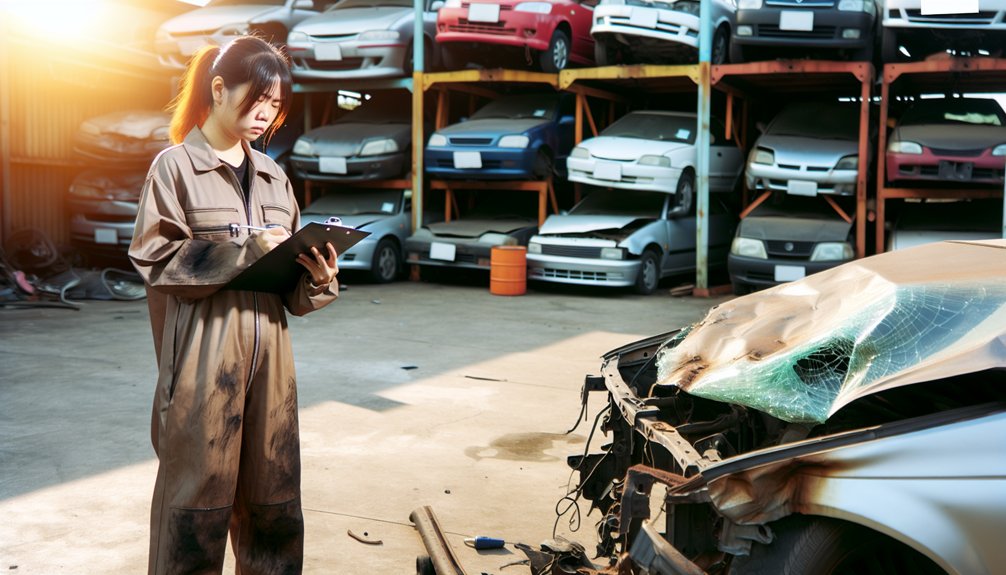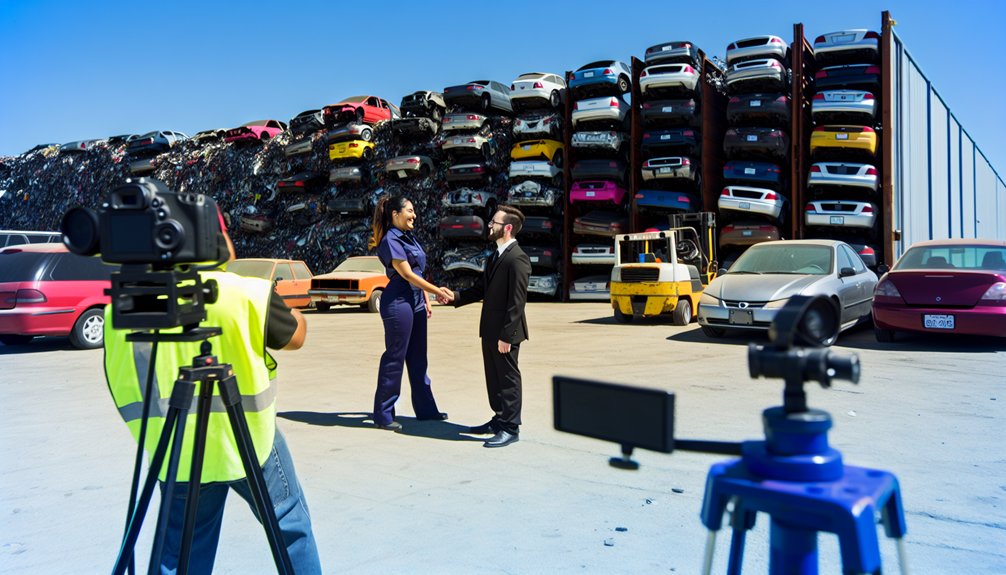If you’re looking to turn that wrecked car into cash, you’ll need a solid game plan. Begin by evaluating the damage and gathering all essential documents, like the title and ID. Discover its market value by checking out similar listings and contacting local scrap yards. Curious about getting the best deal or considering selling parts individually for more profit? There’s a lot more to uncover about this straightforward process.
Key Takeaways
- Conduct a thorough damage assessment to evaluate repair costs versus selling as-is.
- Gather all necessary documentation, including the vehicle title and personal ID, for a smooth transaction.
- Research market value and explore local scrap yards and junk car buyers for competitive offers.
- Consider selling parts individually online to maximize profit from high-value components.
- Finalize the sale by ensuring all paperwork is accurate and arranging for car removal or towing.
Evaluate the Extent of Damage

Before you can sell your wrecked car, it’s crucial to evaluate the extent of the damage accurately. Start with a thorough damage assessment to understand the car’s condition. Look for visible issues like dents, broken glass, and bent frames.
Don’t forget to check under the hood for less obvious problems. If you’re unsure, consider hiring a professional to guarantee nothing’s overlooked.
Next, estimate the repair costs. Compare these costs to the car’s current market value to decide if repairs are worthwhile.
Sometimes, repair costs might exceed the car’s worth, making selling it as-is a better option. By understanding the damage and potential expenses, you can make an informed decision on how to proceed with selling your wrecked car efficiently.
Gather Necessary Documentation
Before you can get cash for your wrecked car, guarantee you have all the necessary documents in order.
You’ll need the vehicle title to prove ownership, along with some personal identification to verify your identity.
Without these, the process could stall, so it’s essential to have everything ready.
Vehicle Title Requirements
When preparing to sell your wrecked car, ensuring you have the right documentation is vital to a smooth transaction.
Start by confirming you have the vehicle title. The title is essential for completing the title transfer process, which legally changes ownership from you to the buyer.
If there’s an outstanding loan on the car, you’ll need a lien release document. This paper shows the lender no longer has a financial claim on the car, allowing you to transfer the title freely.
If your title is lost or damaged, contact your local Department of Motor Vehicles (DMV) to request a duplicate.
Having these documents ready not only speeds up the selling process but also makes it hassle-free for both parties involved.
Proof of Ownership
Having the right documentation plays a significant role when selling your wrecked car. You need to guarantee you have all the necessary paperwork for a smooth transaction.
Start with the most vital document: the car’s title. This document is essential for title transfer and ownership verification. Without it, proving you own the vehicle becomes challenging, and selling it legally could be impossible.
Make sure the title is in your name and free of any liens. If you’ve lost it, contact your local DMV to obtain a duplicate.
Before proceeding, double-check all the details on the title to avoid errors during the title transfer process. Accurate documentation guarantees buyers trust you’re the legitimate owner, speeding up the entire sales process.
Personal Identification Needed
To guarantee a smooth transaction when selling your wrecked car, gather personal identification documents. Meeting document requirements is essential to proceed without hitches. Typically, the identification types you’ll need include a valid driver’s license or a state-issued ID. These documents confirm your identity and facilitate the transfer of ownership to the buyer, ensuring everything’s above board.
It’s also wise to have a secondary ID on hand, like a passport or social security card, just in case additional verification is required.
Double-check that all your identification is up-to-date and not expired, as outdated documents could stall the process. Keeping these identification types ready will streamline your experience, helping you get cash for your vehicle without unnecessary delays.
Determine Your Car’s Market Value
To determine your car’s market value, start by evaluating its condition, noting any damage or missing parts.
Next, research comparable listings to see what similar wrecked cars are selling for in your area.
Don’t forget to factor in depreciation, which can greatly influence your car’s current worth.
Assess Car’s Condition
When evaluating your wrecked car, understanding its current condition is crucial for determining its market value. Start with a thorough car evaluation to assess the extent of the damage. Inspect the exterior, interior, and mechanical components.
Take note of any parts that are salvageable or need replacement. This initial condition report will help you identify repair costs and highlight the car’s overall state.
Check for visible damage like dents, scratches, or broken lights. Don’t forget to inspect under the hood for engine or transmission issues.
Document everything with photos and notes, as this will be useful later. Your honest assessment guarantees you’re prepared when discussing your car’s value with potential buyers, making it easier to negotiate a fair price.
Research Comparable Listings
Kicking off the process of determining your car’s market value involves researching comparable listings. Start by looking for similar wrecked cars on online platforms, focusing on those with the same make, model, and year.
Examine comparable sales to see what others are fetching for vehicles in a similar condition. This step gives you a solid foundation for your market analysis.
Dive deeper by analyzing listings on various websites, noting any patterns in pricing. Pay attention to factors like mileage and specific damages, as they can influence value.
Consider Depreciation Factors
Although researching comparable listings sets the stage for determining your car’s market value, it’s essential to also consider depreciation factors. Every car depreciates over time, affecting its current worth.
Start with a depreciation calculation by considering the age, condition, and mileage of your vehicle. These factors play a significant role in how much your wrecked car might fetch.
Pay attention to market trends as they can fluctuate, impacting demand and consequently your vehicle’s value. For instance, if gas prices rise, fuel-efficient cars might depreciate less.
Alternatively, if there’s a surge in popularity for certain models or brands, it might influence your car’s market value positively. Understanding these aspects helps you set realistic expectations for selling your wrecked car.
Explore Local Scrap Yards and Junk Car Buyers

To get the most cash for your wrecked car, start by exploring local scrap yards and junk car buyers. Research scrap yard locations in your area to find the best deals. Make a list and contact each one to compare junk car offers.
Don’t hesitate to ask questions about their pricing and what factors influence their offers. Many places base their offers on the car’s weight and condition, so know these details before calling.
Keep an eye out for any additional services like free towing, which can save you money. By comparing offers, you’ll have a better understanding of your car’s worth and can negotiate confidently.
Consider Selling Parts Individually
After exploring local scrap yards and junk car buyers, consider the potential of selling parts individually. By doing so, you might maximize your profit through effective selling strategies.
First, assess your car’s parts valuation. Some components, like engines, transmissions, or electronics, can fetch a high price if they’re still in good condition. Research online marketplaces and car forums to see what similar parts are selling for, and use this to set competitive prices.
To enhance your selling strategies, take clear, detailed photos of the parts and provide honest descriptions. Be transparent about their condition to build trust with potential buyers.
Get Multiple Offers for Your Wrecked Car
Why settle for the first offer when you can explore multiple options for your wrecked car? To maximize your potential earnings, seek cash offers from various sources.
Start by listing your car on online platforms dedicated to buying wrecked vehicles. Websites like these connect you with interested buyers who might offer more competitive prices. It’s easy to upload your car’s details, and within hours, you could receive several bids.
Don’t forget social media groups and local classifieds, which can also bring in diverse offers. By reaching out to different buyers, you guarantee you’re not short-changing yourself.
Negotiate the Best Price

Although you’ve gathered multiple offers for your wrecked car, the next essential step is to negotiate the best price.
Start by clearly understanding your price expectations. Know the market value and use it as leverage in discussions. You should be prepared to employ effective negotiation tactics.
For instance, don’t hesitate to highlight the interest from other buyers to create a sense of competition. This can often prompt the potential buyer to increase their offer.
Always be polite but firm in your negotiations; confidence is key. If the buyer’s offer doesn’t meet your expectations, be ready to walk away. Sometimes, taking a pause can lead to a better deal.
Arrange for Car Removal or Towing
Once you’ve finalized the deal for your wrecked car, it’s time to arrange for its removal or towing.
First, check if the buyer offers free towing options. Many companies include this as part of their removal services, saving you both money and hassle. If not, you’ll need to contact local towing companies to get quotes.
Compare prices and availability to find the best deal. Ascertain the towing service is reliable and has a good track record. You don’t want unexpected delays or issues.
Confirm the scheduled pick-up time and provide any necessary access instructions. Some removal services may require you to be present, so plan accordingly.
Finalize the Sale and Transfer Ownership
Finalizing the sale of your wrecked car and transferring ownership is the last essential step in the process.
Once you’ve agreed on a price with the buyer, gather all necessary documents. These typically include your car’s title and any required bills of sale. Completing the final paperwork guarantees a smooth ownership transfer.
Double-check that you’ve signed where needed and provided accurate information to avoid delays. If your state requires it, you might need to visit a local DMV office to finalize the transfer.
Don’t forget to remove your license plates and cancel your insurance policy on the vehicle.
Once everything’s signed and sealed, hand over the keys and documentation to the buyer.
Congratulations, you’re done!
Frequently Asked Questions
Can I Sell a Car Without a Title?
Yes, you can sell a car without a title, but expect limited selling options. Explore title alternatives like obtaining a bonded title or using a bill of sale. Check local laws to guarantee you comply with regulations.
How Do I Ensure a Fair Price for My Wrecked Car?
To guarantee a fair price for your wrecked car, conduct thorough market research. Compare offers from multiple buyers. Engage in price negotiation confidently, armed with information on your car’s value and demand in the salvage market.
What Factors Affect the Demand for Wrecked Cars?
You need to contemplate market trends and buyer preferences when evaluating demand for wrecked cars. Popular car models, parts availability, and scrap metal prices influence buyers’ interest, impacting how much cash you’ll get for your damaged vehicle.
Are There Any Legal Considerations When Selling a Wrecked Car?
While selling a wrecked car might seem straightforward, liability issues can arise. You’re required to disclose its condition. Guarantee it has a salvage title to avoid legal troubles and juxtapose profit with responsibility. Transparency’s your best ally.
Can I Donate My Wrecked Car Instead of Selling It?
You can definitely donate your wrecked car instead of selling it. Many charity vehicle programs accept wrecked car donations. By donating, you support a good cause and might even qualify for a tax deduction.
Conclusion
You’ve navigated the necessary steps to sell your smashed set of wheels. By evaluating the extent of damage, gathering documents, and gauging your car’s value, you’ve geared up for getting good offers. Exploring local buyers and examining individual parts guarantees extra earnings. Negotiating nudges you closer to the best deal, while arranging removal wraps up the process. Finally, finalize the sale smoothly and swiftly. With diligence and determination, you’ve transformed wreckage into a rewarding return.


